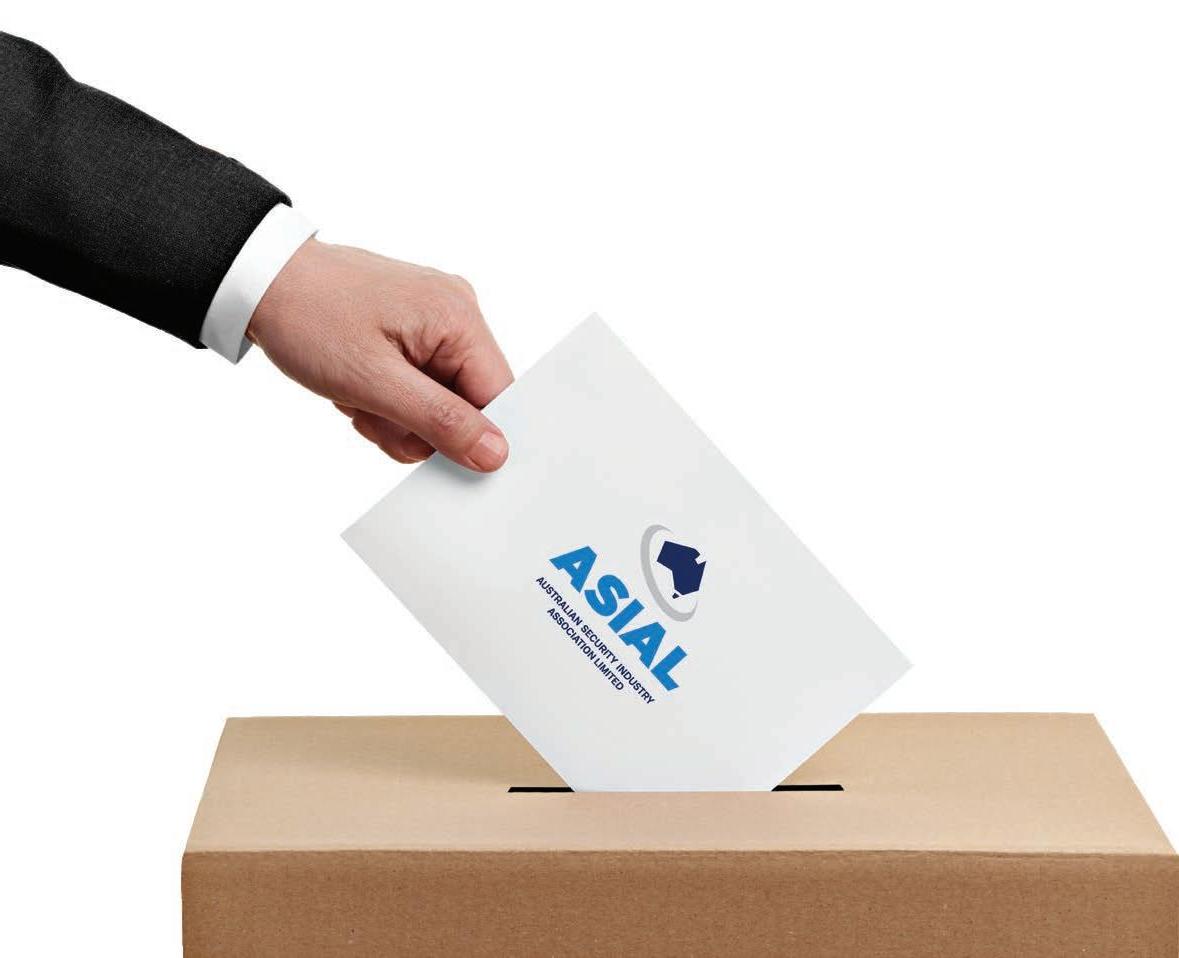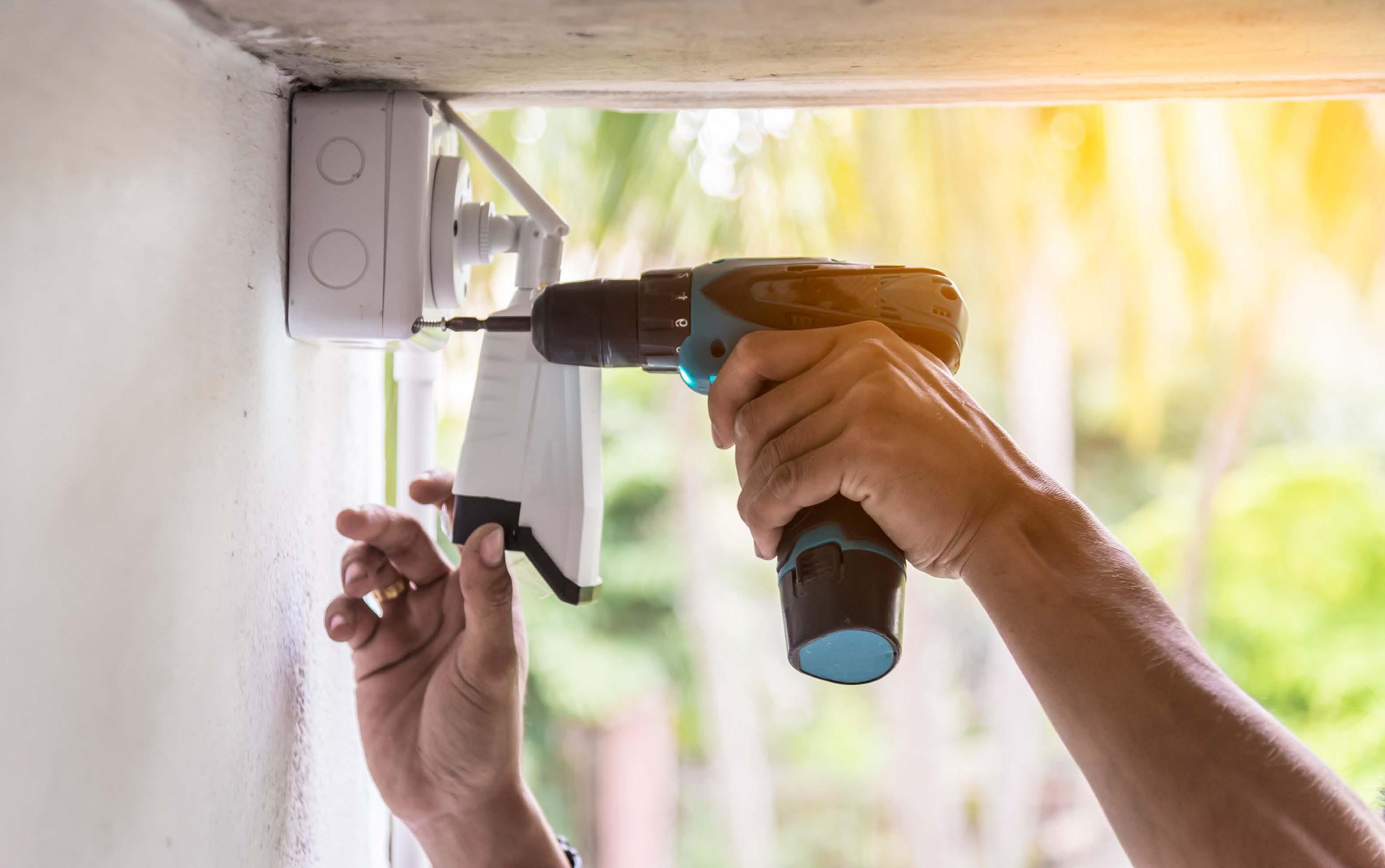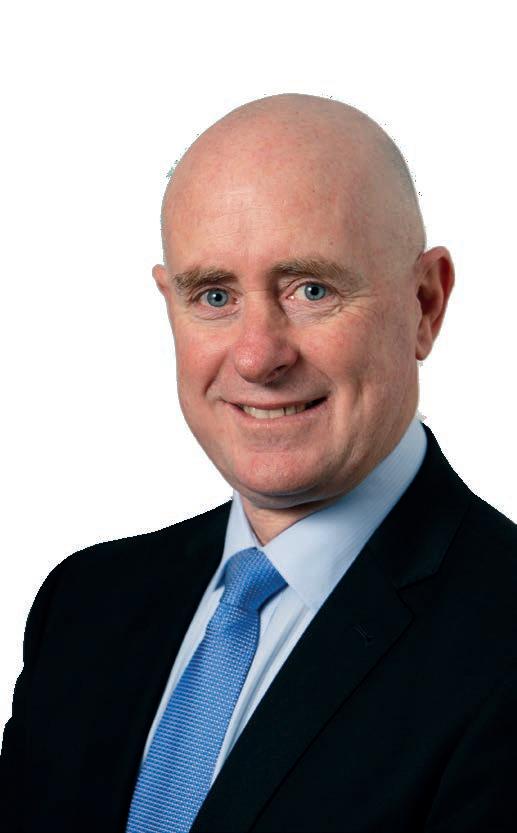
52 minute read
NSW Government Launches Website to Support Fee Free Security Training
ASIAL BOARD ELECTIONS
The Australian Electoral Commission has notified ASIAL of the timetable for the ASIAL Board elections that were delayed due to the COVID-19 pandemic. Details are available to members on the ASIAL website.

ASIAL ENGAGES THE NIELSEN COMPANY
TO UNDERTAKE BENCHMARK SECURITY PERCEPTION SURVEY
ASIAL has engaged The Nielsen Company to undertake research to take a pulse of the Australian population with regards to personal and workplace security. The intention being to provide a benchmark “ASIAL Security Index” to understand sentiments, attitudes and behaviours among the Australian population regarding security issues.
The findings will generate insights that can be used across levels of government and by members to inform conversations with clients. It will also provide an understanding of what drives perception of security in Australia.
Nielsen is a global data and market measurement firm that operates in over 100 countries. Findings of the survey will be available in March 2021.
SECURITY 2021 EXHIBITION & CONFERENCE

The Annual Security Exhibition and Conference will return to Sydney on the 21st to 23rd July at Sydney’s International Convention Centre. And, for the first time in the show’s 35-year history, the event will be co-located with the Integrate Exhibition – Australia’s premier audio visual and integration exhibition.
To find out more go to page 10.
NSW Government launches website to support fee-free security training with information relating to fee-free Security Training.

asial.com.au/nsw-free-security-training
SAFEGUARDING AUSTRALIA 2021 VIRTUAL SUMMIT (3-5 March 2021)
ASIAL is a supporting organisation of the 17th National Security Annual Summit which will focus on Countering Malign Interference, Influence and Pandemic Disruption.
The Safeguarding Australia summit will feature key government and renowned international speakers focussing on four key threats — espionage, foreign interference, right-wing domestic terrorism and pandemics — are all at unprecedented and increasingly dangerous levels, while one, Islamist terrorism remains in continuing sharp focus. These four key areas of threat will be addressed with key senior security experts from the Australian and international community at the 2021 summit.
The Pandemic Forum – New Insights for National Security will be built around key emergency planning elements, Plan, Prepare, Respond, Recover, (PPRR), and seek to address the role of National Resilience Initiative in mitigating the consequences of future events with prevention, mitigation and lessons learnt.
REGISTER AND MORE INFO
To register and for more information, visit www.safeguardingaustraliasummit.org.au/summit-2021 ASIAL Members receive a 15% discount by using the promo code “ASIAL15”.
OCCUPATIONAL
MOBILITY
In August 2020, Treasurer Josh Frydenberg announced that the Commonwealth, and State and Territory governments had agreed to introduce a uniform scheme for the automatic mutual recognition (AMR) of occupational registrations as part of a broader set of redtape reduction reforms to assist Australia’s recovery.
Occupational registrations (or licences) are required for a range of occupations across the economy such as electricians, plumbers and gasfitters, teachers, real estate agents and security workers.
AMR allows a person who is licenced or registered for an occupation in one jurisdiction to be considered registered to perform the same activities in another jurisdiction, without the need to go through further application processes or pay additional registration fees. The AMR scheme will apply to registrations currently covered by existing mutual recognition arrangements. The scheme will make it simpler, quicker and less expensive for people to work across jurisdictions, while maintaining high standards of consumer protection and worker and public health and safety.
On 13 November 2020, National Cabinet agreed to release draft legislation by the end of the year to amend the Mutual Recognition Act 1992, enabling AMR to commence from 1 July 2021.
ASIAL has lodged a submission in response to the exposure draft on AMR. Members can view the submission in the ASIAL members area – www.asial.com.au.

PACIFIC SECURITY CONGRESS
2021

The Conference programme will feature expert panel discussions focusing on technology growth post-pandemic, enterprise security, system modernisation, hybrid cloud solutions, emerging threats and vulnerabilities, and the increasing convergence of Physical and Cyber security. ASIAL Members are eligible to a 10% discount to attend the congress.
MORE INFORMATION
pngsecuritycongress.com
21-23 JULY 2021 ICC SYDNEY
READY TO RECONNECT THE SECURITY INDUSTRY

For 35 years the Security Exhibition & Conference has been the central meeting place for the security industry in Australia, bringing together the full spectrum of manufacturers, distributors, security professionals and end users.

In 2021 for the first time ever, Security will be co-located with our sister show, Integrate Exhibition – Australia’s premier audio visual and integration exhibition – as the industry gets ready to reconnect to drive a post COVID recovery. Network with the industry leaders, discover the latest technology and meet the decision makers who matter.
Contact the team
Soren Nargaard Product Manager +61 2 9275 9234 snargaard@divcom.net.au Leanne Dawson Client Manager +61 3 9261 4560 ldawson@divcom.net.au
BOOK A STAND TODAY
FIND OUT MORE AT SECURITYEXPO.COM.AU #SECURITY2021
Lead Industry Partner
HORIZON 2 0 2 5

A STRATEGY FOR GROWTH
AN ASIAL INITIATIVE
The past year has highlighted the vital frontline role performed by private security as an integral part of Australia’s national security mix.

Whether electronic, physical, protective or cyber security – the industry overall has demonstrated its agility, innovativeness and professionalism in responding to changing customer needs during the pandemic. As the industry’s role grows, so too does the need to build capability and professionalism through implementation of nationally consistent regulatory standards.
As part of its ongoing leadership and commitment to the growth and development of the security industry, ASIAL is funding Horizon 2025 – a major initiative to identify future industry challenges, trends and opportunities. To undertake the project, ASIAL has engaged the Australian Security Research Centre.
Horizon 2025 seeks to set out a ‘best practice’ roadmap for the industry, government and users of security services to deliver an innovative, responsive, professional and respected security industry.
Findings from the initiative will provide invaluable insights and information to help Members plan the future growth and direction of their business and plot the way forward in building a stronger, more professional security industry.
HORIZON 2025 APPROACH
To achieve this requires an understanding as to where the industry is now and where it is heading, both in terms of risk exposures and service provision. This understanding will be achieved by adopting a multi-tiered approach to accessing and evaluating the required information, and will incorporate (i) a document review, (ii) an industry stakeholder survey, and (iii) facilitated stakeholder focus workshops. (i) Document review: Industry statistics and literature pertaining to security risk exposures and industry practices will be reviewed, drawing on both local and international sources. The lens applied during this review will be one of identifying existing and emerging trends, and will not only provide context, but will also form a theoretical foundation on which the subsequent industry stakeholder survey and facilitated stakeholder workshops will build. (ii) Industry stakeholder survey: An on-line survey will be utilised to access the experiences and opinions of industry stakeholders, with a view to profiling the industry and the trends/issues that the same are experiencing and/or regard to be significant. This constitutes the main data gathering tool, and will be distributed by ASIAL, as well as other industry bodies, to security professionals from a range of disciplinary backgrounds. (iii) Facilitated stakeholder workshops: A number of workshops will be facilitated by the project’s research team, each of which will focus on a certain cohort of stakeholders, ranging from security company representatives to regulatory bodies. These workshops will adopt a SWOT (Strength, Weakness, Opportunity,
Threat) analysis approach, and will essentially be asking questions pertaining to the “what”, “why” and “how” of the security industry in Australia, and the direction it is taking as it heads towards 2025 and beyond. Those issues raised by participants will be discussed in a group forum, and later analysed across the workshops to ascertain commonalities and patterns, as well as further areas for consideration.
HAVE YOUR SAY AND GET INVOLVED?
The success of the Horizon 2025 initiative relies on the input and involvement of industry stakeholders. We are urging ALL members to get involved and have their say, whether it is through the industry stakeholder survey or facilitated workshops.
MORE INFORMATION
asial.com.au/Horizon2025
Angelo Gannis 02 9253 8350 angelo.gannis@aon.com aon.com.au/security
Professional Indemnity Insurance © 2016 Aon Risk Services Australia Limited ABN 17 000 434 720 AFSL No. 241141 General Advice Warning The information contained in this advert is general in nature and should not be relied on as advice (personal or otherwise) because your personal needs, objectives and financial situation have not been considered. So before deciding whether a particular product is right for you, please consider the relevant Product Disclosure Statement or contact us to speak to an adviser. COM0350 1217 Do you provide professional security advice in exchange for a fee?
Professional indemnity insurance will indemnify your business against civil liability it incurs in respect of a claim arising from the performance of Professional Services.
Professional Services means professional advice or service charged for a fee (design, consulting, training, risk assessments etc.).
Professional Indemnity Coverage can include claims that arise from: 3 Negligence arising from a Breach of Professional Duty due to an act, error or omission 3 Fraud and Dishonesty of staff 3 Libel, Slander or Defamation against a third party 3 Loss of client documentation 3 Legal liability for damages and claimants’ costs/expenses arising from the act, error or omission/civil liability of the
“Company’s” employees 3 Wrongful or inadequate advice to client(s) 3 Acting without proper instructions from the client 3 Failure to act in accordance with client’s instructions or at all. 3 Failure to advise client 3 Breaches of Trade Practices Act/Fair Trading Legislation– misleading or deceptive 3 Breaches of Statute – e.g.; Corporations Law,
Uniform Consumer Credit Code
For more info please contact Michael Pham +61 9253 7326 or michael.pham@aon.com

CLAIMS CASE STUDY
PROFESSIONAL INDEMNITY
Following several burglaries at an electronics manufacturer’s warehouse, the company engaged the services of a security system company to design, source, and install a new security system.
The security system company was also engaged to train the electronics manufacturer’s staff on the system. The electronics manufacturer claimed that the new system never worked properly, saying that they had ‘black spots’ that weren’t covered by the system and that they had no faith in the system’s ability to protect the premises or goods. The electronics manufacturer engaged the services of an on-site 24 hour guard as an alternative and refused to pay the balance of the contract to the security system company, while also banning them from their premises.
After a ten day trial, the Court found that the security system company had acted negligently and had made misleading representations in breach of section 53 of the Trade Practices Act, now section 29 of the Australian Consumer Law. The security system company was ordered to pay damages of $1,800,000 as well as the legal fees incurred by the electronics manufacturer.
The Professional Indemnity cover offered as an extension to the ASIAL Security Combined Liability policy responded to the Insured’s claim relating to the damages and legal fees, totalling $2,300,000.
If you are unsure if you require Professional Indemnity Coverage speak to Michael Pham your AON Client Manager (Industry Expert) who will provide clarity and insight to identify hidden risks associated with your Security business.
CONTRAVENTIONS OF FAIR WORK ACT BY SECURECORP (NSW) PTY LTD (ACN 108 335 235) TRADING AS SECURECORP NSW
Securecorp NSW has formally admitted to the Fair Work Ombudsman (FWO) that it was involved within the meaning of section 550 of the Fair Work Act 2009 (Cth) (Act) in contraventions of the Act and the Security Services Industry Award 2010 by its previous subcontractors, namely WJS (Aus) Group Pty Ltd (ACN 167 442 033) (deregistered) and MIS Group NSW Pty Ltd (ACN 608 348 269), both trading as Manpower Integrated Services (Manpower), including: • failing to pay casual loading; • failing to pay penalty rates for night span, weekends and public holidays; and • failing to pay overtime for Mondays to Fridays, weekends and public holidays.
The conduct above resulted in identified underpayments of $201,677.55 owing to 49 security guards who worked during the period 6 April 2015 to 21 August 2016.
Securecorp NSW has entered into an Enforceable Undertaking with the FWO (available at www. fairwork.gov.au).
Securecorp NSW has committed to a number of measures to remedy the contraventions including: • rectifying the identified underpayments and paying 5% interest on the underpayments; • establishing a hotline for employees and former employees of Manpower; and • committing to future independent wage audits to verify that employees of contractors are being paid correctly.
Securecorp NSW expresses its sincere regret and apologises for the conduct which resulted in the contraventions by Manpower. Furthermore, Securecorp NSW gives a commitment that such conduct will not occur again and that it will comply with all requirements of Commonwealth workplace laws in the future.
If you worked for Manpower at a site serviced by Securecorp NSW and have queries or questions relating to your employment, please contact Securecorp NSW directly through their non-confidential enquiry line on telephone number: 03 8527 5660 or email address enquiries@securecorp.com.au
Alternatively, anyone can contact the FWO via the website at www.fairwork.gov.au or the Infoline on 13 13 94.

Subcontracting Challenges & Lessons
SECUREcorp NSW has recently entered into an Enforceable Undertaking with the Fair Work Ombudsman (FWO) after investigations found that previous subcontractors were involved in contraventions of the Fair Work Act 2009 and the Security Services Industry Award 2010 in the period from 6 April 2015 to 21 August 2016.


Harrie Veerman Managing Director of SECUREcorp
The subcontractors, engaged by SECUREcorp NSW, trading as Manpower Integrated Services, failed to pay casual loading, penalty rates and overtime to their employees and deregistered the Companies. Under section 550 of the Fair Work Act involvement in the contravention is treated in the same way as the actual contravention and as such, the responsibility to rectify the underpayments has been placed upon SECUREcorp NSW.
The new ownership and management of SECUREcorp have reflected on the journey to this enforceable undertaking and are taking this opportunity to share their lessons learned and the business changes they have implemented to protect their employees, contractors and clients. Here, Harrie Veerman, Managing Director of SECUREcorp shares his insights.
Q: How did you come to join SECUREcorp and at what point in the investigation did your appointment take place? A: I joined SECUREcorp in August 2017. SECUREcorp had been purchased by new owners, Guardforce Group, in mid-2016 and the FWO had advised of the investigations in late 2016, so my appointment came during a significant period of change for the business. It was and continues to be a key policy of the new owners that SECUREcorp complies with and operates within all relevant laws at all times.
Q: What were the main circumstances identified that led to underpayments being made? A: The previous management of SECUREcorp NSW was permitted significant authority over negotiating and entering into contracts at a state level with little oversight from a national perspective. The pressure to compete on very low pricing and margins was also a factor, and this remains a challenge for the industry today.
Q: What have been the key lessons from this experience? A: There have been many lessons but I would have to say, the key lessons are; • the need for strong organisational governance, • it is necessary to have a solid rostering and payment system, • ensuring the profitability of subcontractors as a critical evaluation criteria within the procurement process. This lesson is applicable for all companies that procure security services; and • observing and adhering to the moral and ethical obligations inherent in creating a safe and fair workplace for all employees, whether directly employed or subcontracted.
Q: SECUREcorp underwent a purchase acquisition during the investigation, what lessons were learnt through this process? A: Yes, Guardforce Group took ownership of SECUREcorp in mid-2016 after what at the time was considered a thorough due diligence process. An important lesson learnt is to include a subcontractor compliance review in the due diligence process to avoid situations like this. Throughout the formal acquisition process, we have maintained a relationship with the previous owners and have worked together to achieve this outcome, which is positive for all parties involved.
Q: How has governance and oversight changed within your organisation? A: Significantly. Back in 2016, when the FWO first made us aware of their investigations, the new management team conducted a thorough assessment of all contracting and compliance practices. We have undertaken a comprehensive review of all our existing subcontracting arrangements and, where potential issues were identified, contract provisions were changed, or new, more transparent arrangements were put in place. New policies and procedures have been implemented across the business to ensure there is greater oversight of all contracts and ongoing governance of the contract arrangements.
Q: How has SECUREcorp’s engagement with subcontracting changed? A: As well as overhauling our policies and procedures around how we engage subcontractors, we have also substantially reduced our reliance on a subcontracted workforce, transitioning to a predominantly direct employment model across all SECUREcorp entities.
We recognise that subcontracting has a role to play, for short-term additional staffing requirements, as well as for regional sites. However, we believe direct employment is the best model for both our employees and our clients, wherever possible.
We see a positive change in the market from clients requesting costings based on the Security Services Industry Award. We engage with customers to explain how rates per hour are calculated based on the requested rosters.
Q: What actions is SECUREcorp taking to promote compliance with legislative requirements? A: The new contracting arrangements, policies and procedures that SECUREcorp has implemented have all been developed in strict alignment with the relevant
Fair Work Act and Security Services Industry Award.
We actively promote the legislation and Award as part of our tendering processes to help inform clients and potential clients of the industry requirements as well. It is essential that these industry regulations are taken into consideration when clients are comparing contract proposals.
Q: How do you view the role of the Fair Work
Ombudsman? A: The respect for our security industry is only as strong as the standards to which we adhere. It is critical that the industry is subject to formal oversight. The Fair
Work Ombudsman (FWO), therefore, plays a vital role not only in protecting workers but in protecting the wider industry itself. One point of improvement: We should be able to resolve issues like this more quickly. Although both the
FWO and SECUREcorp have been committed to finding a solution to rectify the underpayment since 2017, compensation for the contracted employees has been delayed whilst waiting for finalisation of agreements and undertakings.
Q: What role do you see workplace laws playing in the security industry? A: SECUREcorp applauds the mission and commitment of the Fair Work Ombudsman in ensuring safe and fair working conditions for employees working in the security sector. The recent COVID-19 challenges have further demonstrated the importance of essential service workers being responsibly procured and supervised. Strong workplace laws that protect vulnerable workers also create safer workplaces, which leads to improved service delivery to clients.
Q: Final Thoughts? A: We want what is best for our workers and the industry as a whole. This is why we were eager to work with the
FWO to rectify any issues arising from actions taken prior to purchase of the organisation. We understand that, for the people affected by those actions, it has been a long wait and we empathise with them. We are grateful to have the opportunity to address those issues so that we can move forward and focus being the kind of employer and security provider that our community expects and deserves.
AI – ARTIFICIAL
Applied Intelligence & Vetted Reliance
By Ryan Kerseboom
Business Services Manager & Security Risk Consultant, Allied Security Management

AI – ARTIFICIAL
In the ever-evolving security environments associated with the government and private security sectors, the pervasive prominence of technology must be acknowledged as possibly the most progressively decisive determinant of how the current - future security landscape presents.
While this development has precipitated many opportunities to enhance security protocols that were previously unavailable (artificial intelligence, biometrics, all manner of actively reporting alarm systems/ warning systems and a ubiquitous reliance on all things internet etc. etc. etc…) my professional predisposition vehemently advocates that our reliance on such technologies at the expense of motivated, proactive and appropriately trained personnel is a grave error that will be extremely difficult if not, impossible to recover from. It is my firm contention that technology and its engagement as a threat vector or indeed, as a tool related to enhanced security agendas has an enormous capacity to lead us into a false sense of security that only becomes more ominous with every new interdependence we engage in. The prolific impact and adoption of technologies for both security and illicit agendas is to be downplayed to one’s own peril! The abundance of opportunities that propagate as a result of all things technological on both sides of the security/crime spectrum could probably best be described as a rush to keep up with the threat that arguably, currently favours the perpetrator/s. Naturally, threats that exist in the digital domain (hackers, phishing scams, distributed denial of service, ransomware, spyware etc.) must be countered primarily in the digital domain however, due to our collective dependence upon technologies like the internet, spill over into the physical domain cannot be avoided.
I have alluded to the predisposed trend within the security industry to resource the tech/IT divisions with explicit inequity throughout my security career and I remain frustrated by an apparent lack of the industry to address the broadening career pathway disparities in the “rush to keep up”. While a proportion of this phenomenon must be expected due to the unprecedented pace with which such technologies impact upon our ethical, legal, economic, recreational etc…etc… institutions, irrespective of security institutions, it is increasingly critical such disparities do not lead us to an irrevocable security
Continues over page >
As the security environment becomes more reliant upon technology to fulfil its mission, the information presented that we base our security decisions on is necessarily less scrutinized for accuracy and veracity.
crisis. As the security environment becomes more reliant upon technology to fulfil its mission, the information presented that we base our security decisions on is necessarily less scrutinized for accuracy and veracity. The implications associated with important decisions made from a foundation of false or inaccurate information can exacerbate the impact that unintentional or worse still, intentional security oversights may have on an organisation or government. In appreciation of this easily overlooked aspect amongst the many, of our collective pivot to technological security paradigms, I am compelled to assert that the existing/future cadres of ‘physical’ security professionals undertake minimum basic training to recognise when such false or inaccurate information becomes the basis of subsequent security practice.
An enticing feature associated with the use of IoT and interconnectedness of virtually every modern electrical device is the expanding exploitation of such devices to utilise the internet for relatively simplistic functions like restock, maintenance alerts, firmware upgrade etc. however, when engaged for sinister purposes, this interconnectedness can introduce enormous security complexities. A basic understanding that such interconnectedness can be exploited as a threat vector with immense repercussions needs to become common knowledge for any security professional so they can take the initial, albeit rudimentary steps to avert an imminent security breach, once discovered.
While the cost associated with technological security enhancements becomes more affordable in accordance with market forces and technological development, such substantial investments towards security agendas must be incurred in conjunction with comparable investment in the people who are to drive such systems and technologies. To date, there is little evidence that any such comparable investment is taking place towards an educated application of physical security based on the information these systems and technology in general, present. Simply stated, once the technology has been paid for and installed, there’s generally no money left for training to engage such systems to their capacity. In recognition such systems have the potential to dramatically impact security response through intelligence led or force multiplying effects, we are quickly approaching circumstances of responders who are unaware a response is required.
If only one concept is taken from this article, it should be for senior managers and informed consumers to recognise that technology is just one link, albeit a highly intricate and complex link in the chain that constitutes security, irrespective of the potentially false ‘secured’ impression that technological investment may suggest. It is unequivocal that technological advancement profoundly leverages both the good and bad relating to security and that such developments dictate investment to maintain the balance towards good. Inevitably, without proportional investment in the people of security, any such investment will be in vain.

About the Author: Ryan Kerseboom
Business Services Manager & Security Risk Consultant Allied Security Management Ryan has a Double Masters Degree in Policing, Intelligence & Counter-terrorism + International Security and a Bachelor Degree of Security, Terrorism & Counter-terrorism and has worked in the government and private security sector for around 15 years. With a unique insight acquired from academic vigour and diverse practical exposure alike, Ryan is capable of integrating the knowledge and skills from both approaches simultaneously. Ryan maintains an inspired and consultative mindset regarding the current dynamics of the security environment in Australia and beyond, with an eclectic appreciation for the extensive considerations of any security.
3WAYS YOUR ORGANISATION CAN UPSKILL TO ENSURE CYBER RESILIENCE How Upskilling Will Help Your Organisation Meet Its Cybersecurity Challenges
By Tony Vizza, CISSP, CCSP
Director of Cyber Security Advocacy, Asia-Pacific, (ISC)2
In September, the Australian Cyber Security Centre (ACSC) published its Annual Cyber Threat Report for the 2019-20 financial year. The report showed that over 59,000 cybercrime reports were made to government requiring ACSC assistance to over 2,200 incidents.

Continues over page >
This report adds to the body of evidence showing that cyber-crime continues to grow all across the world, with cyber-crime now the number one category of crime reported in countries such as the United Kingdom.
The Annual Cyber Threat Report also showed an alarming new development – in April of 2020, incidents spiked considerably. According to the ACSC, this spike was caused by pandemic themed cybercrime. Most of these incidents were caused by malicious emails, compromised systems or brute force attacks. The situation became so dire that in June of 2020, the Prime Minister, Scott Morrison, publicly announced the threat of cyber-attacks and unveiled a range of measures and spending to help address cyber risk to Australian individuals, organisations and government.
Most organisations in Australia and around the world are grappling with the issue of cyber resilience. Of course, it is critical to remember that the foundations of any strategy rest on three broad pillars – people, process and technology – with people remaining the most important aspect. Cognizant of this, the best way to deal with cyber risk is to upskill your organisations staff into dealing with cyber issues.
In this article, we consider the three ways that organisations can upskill their staff to attain cyber resilience.
1
CYBER SECURITY AWARENESS TRAINING FOR ALL STAFF
Information technology resources are used by all members of staff. It is critical that all staff have access to high quality, engaging and relevant cyber security awareness training. Training should be tailored for different job titles and seniority levels. Providers of cyber awareness training include Axelos Resilia and KnowBe4 just to name a few.
Given the rapid shift to working remotely, organisations will benefit by ensuring that family members of staff are also supported in cyber awareness training, including children. Good resources to assist include the Centre for Cyber Safety and Education (www.iamcybersafe. org) and the Australian Governments E-Safety Commissioner (www.esafety.gov.au).

2 3
CYBER SECURITY TRAINING AND ACCREDITATION FOR IT STAFF
Most organisations will employ one or a number of IT staff to manage IT resources. More often than not, these IT staff will also be tasked with cyber security functions. It is crucial for organisations to recognise that IT and cybersecurity are entirely different realms. An IT professional is not necessarily a cyber security professional unless they have trained and become certified in cybersecurity.
Organisations that understand this concept proactively support their IT staff to upskill in cybersecurity. The most common way of achieving this is by attaining a valid industry certification such as the Systems Security Certified Professional (SSCP) certification, which is an AS / NZS 17024 accredited certification and recognised under the Australian Governments Cyber Skills Framework. The SSCP certification is a fantastic add on for systems and network professionals to ensure that their IT work is also performed using cyber security best practices in mind.
CYBER SECURITY CERTIFICATION FOR CYBERDEDICATED PROFESSIONALS
An increasing number of organisations will employ professionals dedicated purely to cyber security. These women and men are tasked with ensuring that an organisations cyber security posture and resilience can meet the elevated threat environment. Organisations should ensure that these professionals are duly accredited both in industry recognised certifications that require continuing professional education such as the Certified Information Systems Security Professional (CISSP), as well as vendor-based accreditation depending on which IT and security vendors are being used.
In addition, organisations should consider upskilling their cybersecurity staff in areas that are growing rapidly or are showing increased vulnerabilities. An example of this is Cloud security, illustrated by the exponential rise in cloud deployments being breached by cyber criminals. As a result, organisations are now funding training for their cyber teams to become Certified Cloud Security Professional (CCSP) certified in order to help meet this new challenge. Another example is the Software and App development space, where software vulnerabilities continue to be a major cause of cyber breach. This has seen rise to the adoption of the Certified Secure Software Lifecycle Professional (CSSLP) certification to ensure that organisations adopt secure coding practices by their development teams.
In conclusion
A major aspect in any organisations cyber security resilience will always remain its people. By ensuring that staff are adequately trained, skilled and certified in cyber security concepts that are relevant to their organisations through upskilling, this will help ensure that your organisation has the appropriate processes in place as well as the right technology in place. Most crucially, it will help your organisation avoid to become another statistic and another data breach headline.
About the Author: Tony Vizza
Tony Vizza is the Director for Cyber Security Advocacy at (ISC)². (ISC)² is an international nonprofit membership association focused on inspiring a safe and secure cyber world. Best known for the acclaimed Certified Information Systems Security Professional (CISSP®) certification, (ISC)² offers a portfolio of credentials that are part of a holistic, programmatic approach to security. www.isc2.org. Tony is also a Board member and director of the Australian Information Security Association (AISA) and Cyber Security Ambassador with NSW Government’s Cyber Security Network Node.
SECURITY IS MANAGING RISK BUT WHO IS MANAGING
MENTAL HEALTH?
By Melissa Harries
Workplace Psychologist
Security operators are in the business of risk management. Whether a specified task undertaken or an informal lens through which all work is viewed, identifying and proactively managing risks before they become emergencies is a guard’s bread and butter.
Given this integral aspect of the job its odd that there is such a big gap in the types of risks the security industry typically considers. Psychosocial threats are rife in most security workplaces yet few organisations have systems to reduce, mitigate and respond when these risks become hazardous to a guard’s mental health.
Psychosocial hazards are psychological and social aspects of the work environment that cause stress. This can include obvious risks to safety like violence at work (“occupational violence”), witnessing a suicide or being in a car accident. But it also includes more subtle demands like long work hours with insufficient rest, excessively overloaded or underloaded (i.e. bored), insufficient training to conduct duties, and being unclear about the boundaries of one’s role.
Ultimately it’s the security guards who suffer, with rates of mental illness a serious concern for the industry.
International research suggests that nearly 2 in 5 security guards meet criteria for post traumatic stress disorder (PTSD) . Security is in the top 3 highest claiming occupations in Australia for workers compensation claims relating to violence at work, with rates similar to Police. Security have similar rates of exposure to occupational violence as Police and yet a fraction of the resources to draw on.
While occupational violence may be unavoidable, there is much that security businesses can do to support guard mental health.
STEP 1. PREVENT HARM

First and foremost, reduce the incidence or exposure to the hazard where possible. Review your incident reports and consider what systems or processes are contributing to reportable incidents, not just who. Think about your workplaces like ecosystems where upstream issues (e.g. leniency with RSA, choke points with crowd flow) may be impacting on the frequency of customer aggression. Is the work rest ratio right? Or are guards being asked to navigate complex interpersonal interactions while fatigued? Perhaps better skills in communication or de-escalation techniques for guards might help to prevent the escalation of violence.
Basic training in human behaviour helped guards in Cairns to manage alcohol fuelled violence. Genuine consultation with guards about their experience of the hazards, and how to address them is helpful, as well as employing the right expert to facilitate skills-based training.
Part of harm prevention also includes building skills in resilience to stress. Stress is an inevitable aspect of work life and while it can’t be eliminated, there are many practical and psychological skills that can be taught to workers to assist them to manage stress at work. Mental Health First Aid training also provides a great foundation for leaders to upskill on mental health.
STEP 2. INTERVENE EARLY
Businesses should have mandatory contact points where guard’s mental health, as a matter of process, is checked in on. For example following a critical incident like being threatened, injured, seeing something gruesome or having a near miss of a serious incident. Security companies might consider a critical incident mental health plan that maps out how and when support will be provided to guards if they experience trauma at work.
A mandatory contact point should also be when signs are identified that a guard’s mental health is suffering (or physical health for that matter – if someone is on sick leave of more than 5 days this should also trigger a check in). Leaders within the business are the centre of gravity when it comes to managing mental health at work. One of the most powerful resources workers can draw on is a good manager who is supportive and confident talking about mental health.
Some of the indicators that a guard is having difficulties with their mental health include changes to: • Performance: absenteeism, late for work, forgetful, makes simple mistakes, inflexible when plans change; • Communication: quiet/withdrawn, argumentative, defensive, excessively checking instructions, overly negative/complaining; • Emotions: reactive/aggressive with customers or other staff (short fuse), teary, flat, numb, nervous; and, • Physical: fatigued, increase sick leave, sleep difficulties, unkempt appearance/poor hygiene, regular sick leave.

To open a conversation about mental health follow the R U OK process of describing what you have observed, your concern and asking how that person is doing. For example:
“Frank I’ve noticed over the last few weeks that you have had a bit of a short fuse with the boys and forgetting things you usually remember. I’m a bit worried about you. Is everything OK?”
STEP 3. SUPPORT RECOVERY
So, you have asked a guard if they are ok and the answer is “no”, what next? A little knowledge about mental health support options is helpful however don’t feel you need to be an expert. The role of leaders in supporting recovery is creating space for problem solving. This means first understanding how the worker is experiencing their problem and then asking good coaching questions to facilitate action. These might include: • What options can you see? • What would help you to manage the load? • What have you tried in the past? • What would help at the moment? • Does your GP know how you feel? • What are your thoughts about counselling? Don’t try and problem solve early in the conversation, even if the solution seems obvious. If the worker doesn’t think that you understand their circumstances they will resist any recommendations you make. You will hear “yes, but [the reason I’m not going to do that suggestion is.]”
If you have an EAP provider then make sure the number is saved in your phone. It says a lot about how normal accessing support is when you can share that contact with your guard. For those who don’t have an EAP consider supporting the worker to access counselling with a psychologist through their GP. Medicare provides a rebate for up to 20 sessions per year. I have seen workplaces have good success reimbursing their staff for any gap payments associated with seeing the psychologist by providing the workplace with a receipt after each session. This can be a cost effective alternate to EAP.
Managing mental health at work can be a daunting task however there are many practical (and cost effective) interventions that security businesses can consider to improve the mental health of workers. It costs little to have a genuine conversation with staff about how they are tracking, and if this is all you are doing to support guard wellbeing, well I think it’s an excellent beginning.
If you would like further information on how to improve mental health in your business I can be contacted via email at melissa@ mindset-psychology.net
About the Author: Melissa Harries
Melissa Harries is a registered psychologist who helps individuals and businesses to be healthier, happier and perform better. She was an Army psychologist who deployed to Afghanistan and East Timor, supporting high performance teams to operate under stressful conditions. Melissa founded Mindset Psychology in 2013 and has worked with a variety of government and private organisations to improve worker mental health through proactive and preventative skills based programs. She is the co-owner of Mindset Securities, a small security firm in NSW.

INVESTING TO GROW YOUR SUPER AND THE AUSTRALIAN ECONOMY

AustralianSuper invests over $180 billion globally. $90 billion is invested here in Australia, where we use our size, deep market knowledge and long-standing relationships to make investments that generate strong long-term returns for members. This includes investments in: • ASX-listed companies • unlisted Australian companies • large infrastructure projects and assets • commercial property assets • Government and corporate bonds • direct loans to Australian companies
These investments also contribute positively to the Australian economy in the following four ways:
1. Helping Australian companies grow
AustralianSuper has a long history of helping Australian companies grow, both as an investor in ASX-listed companies and as a lender to public and private companies.
The Fund currently has $32 billion invested in or loaned to Australian companies. These companies include some of Australia’s largest businesses that together employ hundreds of thousands of Australians.
This support is particularly valuable in periods of volatility, such as the COVID-19 downturn. Since the onset of COVID-19 in March 2020, AustralianSuper has supported 20 Australian companies with over $380 million in new capital to help navigate the current challenges and position themselves for growth. This new investment in companies also helps to support the ongoing stability of Australia’s financial markets.
2. Advocating for better ESG outcomes
Being a long-term investor means the Fund can develop meaningful relationships with companies, and impact positive change. By engaging with a company’s board, for example, we can advocate for better environmental, social and governance (ESG) outcomes in the markets and communities in which they operate. Examples include advocating for companies to commit to an action plan to support our transition to a low carbon economy; and calling on companies to meet our expectations in relation to gender diversity on boards.
3. Owning and investing in Australian infrastructure
AustralianSuper is one of Australia’s largest infrastructure investors, with a portfolio of over $11 billion of Australian infrastructure assets. This includes direct investments in: • Ausgrid (electricity distribution) • WestConnex (motorway networks and tunnels) • NSW Ports • Transurban Queensland (motorway networks and tunnels) • Perth Airport These assets improve the efficiency of Australian businesses, support jobs and contribute to the quality of life in Australian communities.
4. Fostering Australian innovation
AustralianSuper believes in supporting companies who are innovating for a better future. To date, the Fund has committed to invest more than $1 billion to support emerging industries and promising Australian companies. This includes: • A commitment of approximately $700 million to
Australian venture capital funds, • A dedicated in-house investment team focussed on identifying and investing in small and/or early stage ASX listed companies to support their growth plans, • An investment in Assemble Communities, a start-up affordable housing provider, to help fast-track the development of affordable housing projects in our cities.
TO READ THE FULL ARTICLE
australiansuper.com/investment-articles
Asset allocations as at 30 June 2020. Sponsored by AustralianSuper Pty Ltd ABN 94 006 457 987, AFSL 233788, Trustee of AustralianSuper ABN 65 714 394 898. This information may be general financial advice which doesn’t take into account your personal objectives, situation or needs. Before making a decision about AustralianSuper, you should think about your financial requirements and refer to the relevant Product Disclosure Statement, available at australiansuper.com/pds or by calling 1300 300 273.
2020
A YEAR FOR THE HISTORY BOOKS

When the year began, we had already been in drought for ages and much of the country was either on fire or covered in choking smoke. Then came floods and of course COVID-19, which brought in its wake painful lock-downs and the first economic recession in Australia for nearly 30 years. But despite this perfect storm of problems, the country teamed up and overcame it all. And the security industry played a major frontline role.

A Highly Unlikely Year
History tends to note specific events that cause major changes to the status quo. Revolutions, assassinations, plagues, the movement or isolation of large groups of people, economic crashes and important technical or medical breakthroughs characterise historic events. 2020 had a combination of these. Close to a million deaths worldwide in one of the worst pandemics ever recorded, economic ruin in many countries, entire cities and states locked down, the creative use of technology by entire working populations and the quick development of lifesaving vaccines all contributed to the historical importance of 2020.
In Australia, many businesses may have found it hard to believe only a year earlier that it would become possible to send almost everyone home from the workplace and still continue to function. But this is what happened in 2020 as businesses large and small closed their offices and factories, sending staff home to plug in and work remotely. The anticipated widespread cancellation or suspension of security contracts did not eventuate and some security companies even recorded one of their busiest years in 2020. ASIAL recorded a net increase in membership, which may be due in part to a hike in security demand across the country. Of course, 2020 saw many failures and tragedies too. Close to a thousand COVID related deaths nation-wide, nearly a million out of work and of course, the unthinkable – economic recession (albeit shortlived). Some in the security industry were very concerned that the overall shrinkage in business activity would mean hardship for the industry. Indeed, in Victoria alone, some major events were closed to the public or cancelled outright, which impacted many security companies. But in Queensland, the AFL Grand Final was an example of compensators around the country generating a ‘swings-androundabouts’ effect.
A Year of Challenges and Innovation
They say that necessity is the mother of invention and this was certainly the experience of 2020 for the Security Industry. Resourceful security companies innovated new and improved ways of marshalling their people to meet increased demand – and not just the labour-intensive hotel quarantine programs. The problematic Victorian Hotel Quarantine Program
covered about 16 hotels and about 400 security officers sourced from three companies. However, their difficulties were not experienced in other states (such as the much larger New South Wales program with 850 security officers per day working in 26 hotels), where private security was engaged to great effect. The Coates Inquiry revealed why and how the Victorian program failed - not just in the corridors of quarantine hotels, but at all levels of the Victorian Government. ASIAL has maintained a close dialogue with all governments, including Victoria, contributing data, advice and expertise. Without carelessly inflaming an already sensitive situation, the Security Industry has worked very hard behind the scenes through 2020 to help build improvements into Hotel Quarantine Programs and add value to security across the board.
Technology has also undergone accelerated development and deployment in 2020 with some security companies bringing forward plans to equip body cameras to Security Officers and roll out new thermo-imaging, facial recognition and biometric hardware and software. Demand for security services is increasing quickly and this is expected to continue in coming years as more customers discover the value of emerging security technologies and the expertise of the Security Officers who deploy them.
The New COVID Norm

2020 has spawned a vocabulary of its own with new commonplace terms such as “Iso”, “Lockdown”, “Social Distancing”, “Contact Tracing”, “Patient Zero”, “Zooming” and of course “The New Normal”. Many a commentator has speculated that these recent additions to our culture are here to stay. The pandemic has affected how we get our news and stay connected. In Australia, the average time spent on social media has grown by 30% during 2020, according to a recent Social Media Census by L&A Research. 75% of workers believe that post-COVID-19, their employers are more likely to support work-from-home than they did before the pandemic. In 2020, the number of work-from-home days doubled for managers
The Victorian Hotel Quarantine Program yielded up some very painful but ultimately valuable lessons for the Victorian Government and all parties involved.
and almost tripled for employees in sales and clerical/administration work, according to Sydney University research. The impact is felt in retail as well. Australia Post’s 2020 eCommerce Update reports that online shopping continues to boom across the country – not just in metro Australia but across the regions too.

What’s in Store for 2021 and Beyond?
The Victorian Hotel Quarantine Program yielded up some very painful but ultimately valuable lessons for the Victorian Government and all parties involved. The Coates Report revealed that the hastily-assembled program underscores what ASIAL has been telling the Victorian Government for some time with respect to that state’s regulation of the security industry. The excessive use of subcontractors, the dangers of fake ABNs, use of people on student visas in security roles, a lack of supervision of pay and conditions for security officers are some examples of where reform is needed. In contrast, the overall success of the New South Wales Hotel Quarantine Program has led to the Government calling on private security to increase its contribution to a much-expanded program that will cater for returnees from overseas and foreign students. A Government-backed education and re-training scheme is underway to re-skill people made unemployed during COVID to start work as Security Officers. Such a program will add valuable capability into the State’s security arrangements as well as much-needed capacity.
In factories and office blocks, stations, airports, hospitals and schools, in city streets and many more locations, security equipment and security officers are going to play a rapidly-increasing role. Security is already by far the largest cohort of the frontline security team in Australia, greatly outnumbering all the police forces and indeed the Australian Defence Force. Private security is a key presence in policing, Defence Force Security and in the urban environment.
It is becoming increasingly obvious that Australia – indeed the world – is likely to experience growing demand for security services. Our attention is focused more and more on online dangers, home security, the security of work premises, urban safety and for that matter, the threat to the nation from hostile actors such as terrorists or cyber attack. These concerns suggest that there is not going to be less demand for security services but much more demand. There is not going to be less security technology engaged in law enforcement and security arrangements but much more. Therefore, it is reasonable to predict that the Australian Security Industry will require more qualified officers entering the system, who are expert in the installation and/or use of sophisticated security technology.
2021
A YEAR OF PROFOUND CHANGE
By Chris Delaney
ASIAL Workplace Relations Advisor
2020 was a difficult year for employers in so many different ways. Yet 2021 is already shaping up as a year of changes that will challenge many of the ways in which employers in the security industry – and the clients - have operated for many years. The business models common to many will need to be reviewed, businesses will need to become more agile and workplace regulations will undergo significant change.

So, what are some of the workplace issues which will affect the industry in 2021?
CASUALS AND INSECURE WORKERS
Without doubt the biggest issue facing employers in the private security industry – especially protective security services – will be what happens with casual loadings, rights to annual leave and sick leave, setting off loadings against other benefits and conversion to full or part time.
The Casual issue is not new, but it has come to the point where Unions, employees, employers and the Government have to sort out the ambiguities to ensure certainty for all stakeholders.
The fact that the parties might agree to call the relationship one of casual employment is relevant, but is not conclusive to the true nature of the relationship. The actual practice and factual matrix must be considered.
In the recent cases – Rossato v Workpac and Skene v Workpac - the Courts determined that the absence of a firm advance commitment may be assessed by considering the employment contract as a whole, including whether it: • Provided for employment to be intermittent or irregular; • Permitted the employer to elect to offer employment on a particular day; • Permitted the employee to elect whether to work; • Is unlikely to continue for any length of time; and • Terminable on short notice.
The major issues to be resolved in 2021 include: • Defining what constitutes casual employment; • Overcoming the possibility of the “double dip” – casuals getting a 25% loading and being entitled to accrue annual leave and personal leave; • Whether the 25% loading can be set off against any annual leave or personal leave awarded by a court; and • Sorting out the details for conversion from casual to full time or part time. The
Government reform Bill is inconsistent with conversion clauses that already exist in modern awards.
Merely paying an employee a 25% loading doesn’t mean the employee is a casual. If an employee works regularly and systematically and has a genuine expectation of continuing employment they are not a casual. They may be a full time or part time employee depending on the number of hours regularly worked. Right now employers should? • Review your casual staff to determine whether their hours and shifts appear regular and systematic over the course of their employment, particularly for any longstanding
“casual” employees and identify any risks; • Establish a system to monitor casual hours; • Review employment contracts to ensure any set-off clauses are drafted to clearly identify what is covered by the casual loading; • Review actual work practices for those workers; • Consider offering casual conversion to “high risk casuals”; and • Ensure that casual contracts do not have a clause stating that casual loading entitlements are paid in lieu of the NES entitlements.
IR REFORMS
Following on from the “round table conferences” chaired by the Attorney General Christian Porter, the Morrison Government introduced to Parliament its IR reform Bill (the Bill focusing on several key areas of industrial relations legislation.
THE BILL
Casual and Part Time employment
Under the new laws a casual employment relationship will be assessed based on what was agreed at engagement. It also contains the facility to set off the 25% casual loading against entitlements to other permanent employee entitlements if later found to be permanent employees ‘at law’.
Permanent employment must be offered after 12 months if, during the previous six months, casual employees had ongoing, regular work. This is not required if there are reasonable grounds for not doing so.
Part-time employees covered by a modern award working at least 16 hours a week can agree to work at least 3 ‘additional agreed hours’ (within the ordinary span of hours) without overtime payments.
Enterprise Agreements
The new laws remove some obstacles for employers making enterprise agreements. For example; • Employers will only be required to take reasonable steps (as opposed to all reasonable steps) to notify employees when voting for enterprise agreement is occurring.
Continues over page >
Wage theft is not meant to apply to unintentional conduct or honest mistakes, but is reserved for wilful or deliberate conduct.
• Employers will only be required to take reasonable steps to explain the terms of proposed agreements and give relevant employees access to the materials they will be voting on. • Casual employees will not be allowed to vote on enterprise agreements.
Compliance and enforcement
• Either by a Court order or by application from the parties, conciliation of underpayment claims less than $50,000 will be able to be heard and or arbitrated by the Fair Work Commission. • Employers who dishonestly engage in a systematic pattern of underpaying one or more employees may be subjected to penalties up to a maximum penalty of $5.55 million for body corporates, and $1.11 million and / or 4 years’ imprisonment for individuals. • The Fair Work Amendments Bill needs to pass both Houses of Parliament before any of the above changes can be introduced.
This will not happen until late 2021 and not easily, with strong opposition from Labour and the ACTU on several issues which may only occur in 2021.
Industrial Manslaughter
Laws dealing with Industrial Manslaughter have been introduced. Industrial Manslaughter currently exists in the ACT, Queensland, Victoria and the Northern Territory, and soon to become law in Western Australia.
As opposed to traditional risk-based offences in WHS, Industrial Manslaughter offences are outcome-based offences, brought on by a death in the workplace.
In most jurisdictions, the offence of Industrial Manslaughter is committed when ‘negligent’ conduct causes the death of a worker.
Employers will need to review policies, WHS compliance systems and reporting processes to fit with this changed focus.
The New South Wales government has no plan to introduce Industrial Manslaughter laws. It does plan to insert a drafting note into the current Work Health and Safety laws, that when a person dies at a workplace, it may constitute manslaughter under the State’s Crimes Act.
With so much disparity between the various state and territory legislation, now is the time for employers to review policies and procedures to ensure: • Information is provided to board members about safety issues and risks and responses; • Management understands and accepts its responsibility to oversee the daily operation and effectiveness of the organisation’s safety systems; • Risk assessments and controls are reviewed and updated, where appropriate, on a regular basis; • Record keeping systems, actions and training are up to the task.
Wage Theft
The Queensland Criminal Code was amended on 14 September 2020 to enable wage theft to be prosecuted as stealing and to increase the maximum penalty for stealing by an employer to 10 years’ imprisonment along with substantial individual and company penalties.
An employer will be liable for wage theft if they fail to pay an amount payable to an employee in relation to the employee’s performance of work when the amount is due (under an Act, industrial instrument or agreement) and the employer’s conduct is fraudulent.
A person will be an accessory if that person, knowing the essential circumstances of the company’s wage theft, intentionally assisted or encouraged the company to commit the offence.
Wage theft is not meant to apply to unintentional conduct or honest mistakes, but is reserved for wilful or deliberate conduct.
Similar legislation has been enacted in Victoria, and Western Australia has recently proposed similar legislation.
Employers would be well advised to check that their payroll systems are fully compliant and capable of calculating wages accurately in accordance with the appropriate awards and their legal obligations to employees.
We have outlined in brief some of the major issues employers may face in 2021. For more detail and /or discussion on the particular circumstances of your business, ASIAL members can contact ASIAL’s Workplace Relations Advisor – ir@asial.com.au.
About the Author: Chris Delaney
Chris Delaney is a highly regarded employee relations professional with over 40 years’ experience in industrial relations and human resources.
Note: The information provided above is for convenient reference only. ASIAL and Chris Delaney & Associates Pty Ltd provide this information on the basis that it is not intended to be relied upon in any cases, as the circumstances in each matter are specific. Accordingly, we provide this information for general reference only, but we advise you to take no action without prior reference to a workplace relations specialist.
ASIAL’s Security Insider Podcast Series
The ASIAL Security Insider Podcast series explores some of the issues and challenges facing the security industry.

Julian Claxton
Tony Keane
EPISODE 40
Capitol Hill and The Insider Threat In this episode, we speak with Julian Claxton about the recent security breach of the Capitol building in the US and the possible security implications. What sorts of threats might a breach of this type entail and what can organisations learn from this experience to help enhance their own security?
EPISODE 41
The Show Must Go On: The Role of Security in the 2020 AFL Season In this episode, we speak with Tony Keane Head of Integrity and Security for the AFL (Australian Football League). What does it take to move 2500 players, staff, officials and family members interstate, and then ensure the safety and security of those people during one of the worst global health crises in modern memory, to enable the 2020 AFL season to proceed? Tony shares his experiences from 2020 providing insight into the role that security played in enabling the last year’s AFL season and why the season may not have gone ahead without the aid of private security.
Apple Podcasts
Visit www.asial.com.au/asialpodcasts
Subscribe on

RECOGNITION PROGRAM
CATEGORIES:
PLATINUM – 25 YEARS +
GOLD – 16 – 24 YEARS
SILVER – 11 – 15 years
BRONZE – 6 – 10 years
The ASIAL member recognition program acknowledges longstanding members. We would like to congratulate the members to have recently achieved the following recognition levels:
BRONZE
Assetlink Services Pty Ltd t/a Assetlink Blue Force Pty Ltd Empire Security Services Pty Ltd Etec Security Pty Ltd IHand Communications Pty Ltd Rapid Protection Australia Pty Ltd Sekure Pty Ltd t/a Tasc Digital Control Systems (WA) Steel Family Pty Ltd t/a It’s Secure Sure Fact Australia Pty Ltd Taylor & Sons Pty Ltd t/a Matrix Security Integration Tech Streaming Pty Ltd Tony Lucca t/a T. L. Security Service NSW WA ACT VIC NSW QLD WA VIC VIC TAS NSW VIC
SILVER
Access Alarms QLD Pty Ltd Bentech Electronic Security Pty Limited Conigrave Pty Ltd t/a RMI Security Gentac Australia Pty Ltd Incite Security Pty Ltd Northern Star Professional Security Services Pty Ltd Paradym Pty Limited Pattison Security Technology Pty Ltd Paul David Romano t/a Your Local Sparky.com R. H. O’Toole Pty Ltd t/a Roma Security Service SDS Training and Security Pty Ltd The Cabling & Security Guys Pty Ltd Victor Harbor Security Victorian Property Protection & Security Services (VIC) Pty Ltd
GOLD
Anthony Paul John Aubeck t/a S.C.E.M Security Services Arthur Pentes Investments Pty Ltd t/a Metro Electrical & Security CCTV Hire Pty Ltd Comsec Surveillance Pty Ltd t/a ICU Security Cameras Corporate Shadows Pty Ltd Intelec Electrical & Security Installations Pty Ltd MCM Protection Pty Ltd The Instalarm Security Pty Ltd t/a ANSA Global Security
QLD NSW NT NSW WA NSW NSW NSW NSW QLD QLD NSW SA VIC
NSW ACT NSW NSW VIC NSW WA WA
NEW MEMBERS OF ASIAL PROFESSIONAL RECOGNITION PROGRAM
An individual recognition program for security professionals committed to the highest standards. More at: https://www.asial.com.au/membership-information/professional-program
MEMBER ASIAL PROFESSIONAL PROGRAM
Danijel Music
James McKelliff NSW
SA



